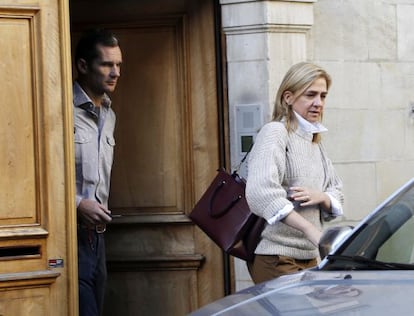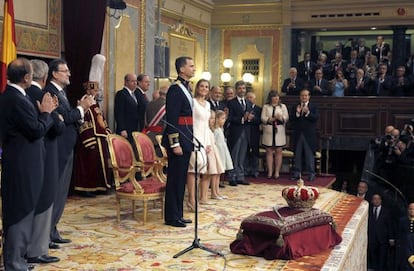Will Cristina give up rights to throne?
Royal household is hoping for symbolic move after news she will stand trial for tax crimes


The Spanish royal household on Monday insisted that it is entirely up to Cristina de Borbón, the king’s sister, to decide whether she renounces her symbolic rights to the throne due to her involvement in a criminal investigation.
The House of Bourbon insisted on its “absolute respect for the independence of the judiciary” and said it would not pressure the infanta into giving up her claim to the throne. Yet the gesture would be very welcome at the royal residence, sources said.
Cristina de Borbón is sixth in the line of succession and thus only had a slim chance of reigning, but the institution feels that giving up these rights would distance the royal family from the scandal that has engulfed Felipe VI’s sibling.
On Monday, a judge in Palma de Mallorca decided that Cristina de Borbón will stand trial for her alleged involvement in the Nóos case, which primarily affects her husband Iñaki Urdangarin.
Urdangarin, a former Olympic handball player who married the princess in 1997, faces multiple criminal charges in connection with a non-profit company he created with business partner Diego Torres to secure public contracts from the regional governments of Valencia and the Balearics.
The lucrative contracts were obtained without bids, and services for sports events were grossly overcharged, investigators determined. The partners are alleged to have channeled as much as €6 million to private firms that they owned.
Cristina’s suspected involvement in the case stems from the fact that she was part owner of Aizoon, one of the front companies used to receive the funds, and that she used a company credit card for personal purchases – dance lessons, children’s parties, movie tickets, etc. – which she then deducted from her tax filings as business expenses.
As such, she faces charges of tax fraud for the years 2007 and 2008. The judge’s decision to put her on the stand comes despite strong opposition from the anti-corruption attorney, Pedro Horrach, who has defended Cristina’s innocence throughout the investigation and has fallen out with Judge Castro over this issue after years of working as a team against corruption in the Balearics.

A top aide to former monarch Juan Carlos once defined the Nóos case as “that torment,” and in October 2011 the royal house dropped Urdangarin and Cristina from its official agenda in a bid to distance itself from the scandal at a time when Juan Carlos’ popularity was at an all-time low over a series of gaffes, including a secret elephant hunt in Botswana.
When Felipe became the new king of Spain in June, he did not invite his sister to come and witness the historic event.
Juan Carlos’ youngest daughter apparently took this banishment as a personal affront, a condemnation ahead of the trial, and has resisted severing her symbolic ties to the Spanish throne.
Tu suscripción se está usando en otro dispositivo
¿Quieres añadir otro usuario a tu suscripción?
Si continúas leyendo en este dispositivo, no se podrá leer en el otro.
FlechaTu suscripción se está usando en otro dispositivo y solo puedes acceder a EL PAÍS desde un dispositivo a la vez.
Si quieres compartir tu cuenta, cambia tu suscripción a la modalidad Premium, así podrás añadir otro usuario. Cada uno accederá con su propia cuenta de email, lo que os permitirá personalizar vuestra experiencia en EL PAÍS.
¿Tienes una suscripción de empresa? Accede aquí para contratar más cuentas.
En el caso de no saber quién está usando tu cuenta, te recomendamos cambiar tu contraseña aquí.
Si decides continuar compartiendo tu cuenta, este mensaje se mostrará en tu dispositivo y en el de la otra persona que está usando tu cuenta de forma indefinida, afectando a tu experiencia de lectura. Puedes consultar aquí los términos y condiciones de la suscripción digital.








































